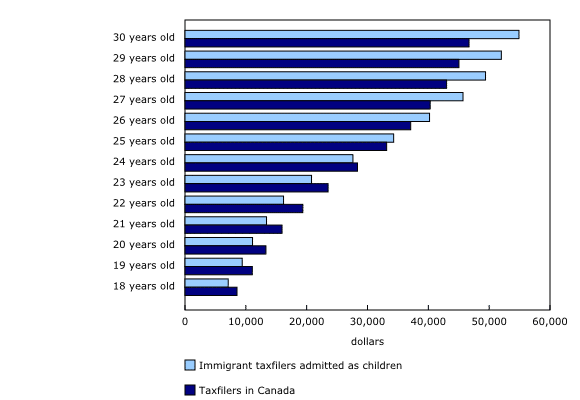A recent Statistics Canada study has found that newcomers who settled in the country as children are more likely to pursue higher education and have better economic outcomes.
In fact, this group of newcomers reported higher incomes than all other Canadians. tax filers at the age of 25.
Find out if you are eligible for Canadian immigration
The sooner the better
Looking at data available through the Longitudinal Immigrant Database (a huge data model that tracks long-term data on immigrants arriving in Canada), researchers found a positive correlation between how quickly a newcomer was admitted in Canada and their likelihood of continuing with their post-secondary studies. education.
For example, among immigrants who initially established in Canada at age 4, 77.3% participated in postsecondary education by age 20. This finding was consistent with those who settled in Canada between the ages of 5 and 9: 69.9% of whom participated in Post secondary education; and those who settled in Canada between the ages of 10 and 14 (61.3% of whom participated in post-secondary education).
In comparison, only 59.9% of all Canadian taxpayers participated in post-secondary education by age 20, demonstrating that newcomer cohorts had a significantly elevated post-secondary education participation rate, even compared with all Canadians.
This finding paralleled the economic outcomes of newcomers based on how young they were admitted to Canada. Specifically, newcomer taxpayers who were admitted to Canada reported higher incomes than the average of all Canadian tax filers in their age group.
Interestingly, however, this finding was not immediate but was delayed due to the age of the taxpayers. For example, immigrants who were admitted to Canada as children had slightly lower median wages than all other Canadian taxpayers aged 18 to 24. However, after age 25, the median salaries of this cohort of newcomers equaled or exceeded the median salaries of all Canadian taxpayers in the same age group.
At age 30, newcomers admitted to Canada as children had an average salary 17.6% higher than all other Canadian taxpayers in the same age group. These findings are detailed in the following graph.
What do these results indicate?
The results of this study seem to indicate that both participation in higher education and labor market outcomes have a positive impact for newcomers who arrive in Canada at a young age, with a greater effect for those who arrive in Canada earlier. . The study further suggests that newcomers who are admitted to Canada earlier have better outcomes not only than those who arrive later in the country, but also the Canadian population as a whole. The study does not suggest reasons for this phenomenon, and more research is needed to explain how these results occur.
These data add to the literature suggesting a positive correlation between the youth of immigrants at the time of their admission to Canada and successful economic outcomes in the country, in the short, medium and long term.
Interestingly, other studies have also suggested that the positive relationship between how quickly an immigrant arrives in Canada and their income increases over time. This is also reflected in the scoring weighting that Comprehensive classification system (CRS) yields to age, and younger newcomers see an advantage due to their youth.
reference: www.cicnews.com
